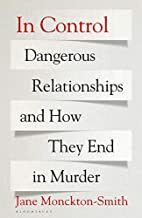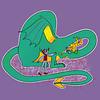Take a photo of a barcode or cover
Not an easy read. Describes abusive relationships as typically following 8 ever escalating steps which can potentially end in murder. These steps demonstrates how the "crime of passion" defence is a crock of shit.
informative
inspiring
fast-paced
challenging
dark
informative
reflective
fast-paced
challenging
dark
hopeful
informative
medium-paced
A must read for any forensic psychology fans. Big trigger warnings for domestic abuse, emotional abuse, suicide, self harm & homicide. This book outlines the domestic homicide timeline - a pattern of steps offenders usually follow before they murder their partner. It uses case studies and research throughout to prove its points which really adds weight to all its claims. I found it really interesting especially as coercive control in romantic relationships is starting to be taken seriously legally and I think more people should know the warning signs of an unhealthy relationship. I’m by no means saying that someone who is controlling will commit murder but it is still incredibly harmful for the victim and they might not even know it. Would highly recommend the audiobook version.
challenging
emotional
informative
inspiring
reflective
sad
This book was game-changing for me and absolutely inspired where I want to go next within my career - into helping in a hands-on way with helping to fight domestic abuse. 'The Court Said' and the AAFDA are both organisations that this book brought to my attention that I think deserve a lot of support and help.
There were so many striking and important points in this book but the following really impacted me the most:
There were so many striking and important points in this book but the following really impacted me the most:
- A history of controlling behaviour, even jealousy, is a red flag
- 'Controlling people expect that commitment is to them rather than from them, and for life'
- 'There is a term - gaslighting - that refers to a pattern of behaviour designed to make victims of control feel that they are unstable' ... 'Gaslighting generally works by making victims unable to trust their own perceptions and instincts, and they can become afraid to make decisions without help' - This was really impactful as I am to my friends notoriously indecisive and I definitely got a lot worse after suffering through a lengthy relationship full of being gaslit.
- The metaphor of the Panopticon - where the prison officer can see the prisoners but the prisoners can never seen the prison officer, so never know if they are being watched - was SO good and SO powerful
- 'Vanilla' being used as an insult, making women/girls feel inadequate and using this to manipulate them into sexual acts that frighten/hurt them - I think this point hit a lot harder due to having to recently learn the ins and outs of the new Non-Fatal Strangulation legislation and the statistics behind the legislation state that partners who have strangled their partner in the past are more likely to kill them.
- Threats of suicide should be read as a threat of homicide - they may cause harm due to 'last-chance thinking'
The case study of Mick Philpott and the murders of his children - the coverage always covering 'benefits-culture' and never the coercive control over the wives. - 'I also became acutely aware that the only person who could absolutely guarantee my daughter's safety was the person abusing her. He could decide if or when he would hurt her. He could decide to stop, or not. It was entirely understandable that she focused on him and what he wanted.' - This made me cry as it truly gave me the perspective of my mum a couple of years ago and that truly broke my heart in ways it didn't break for myself.
'If you ever wonder what it is like to be a terrified victim of coercive control, just imagine the other person as a person with a gun who you absolutely believe would be happy to shoot you. Then think about how you think someone should act, or rethink what you have been told about how they reacted or behaved'
“It is not a private matter, and it is not simply a police matter; it is in all our interests to stop giving abusers excuses and justifications for controlling and self-centred patterns. ”
The best way to describe this book is that if domestic abuse and coercive control had never touched my life, this book would be able to educate me about these patterns.
Reading real life interviews of these families make these women more than statistics and the murderous men who kill them to be seen as controlling rather than the victims.
Being able to recognise these stages of the eight timeline is a key issue that should be learnt more to be able to keep women safe from a worryingly statistic of intimate homicide. And answers the question of ‘why didn’t she just leave’ , these people are under an insane amount of pressure to meet the perpetrators ego loyalty and control where leaving isn’t a safe option sometimes and the book explains and rejects why victim blaming isn’t acceptable. It can be an insight to these relationships and provides a responsibility to educate and recognise coercive control.
“The controlling patterns are not responses; they are systems to enforce and monitor control. Always there, always working.”
“To lose that control, or to have it usurped, can feel like humiliation, weakness and failure. I was fascinated to read that most displays of power, most fights over inconsequential and trivial things between men, most shows of anger, are for the benefit of other men, not women. There is a huge pressure to maintain stat”
The best way to describe this book is that if domestic abuse and coercive control had never touched my life, this book would be able to educate me about these patterns.
Reading real life interviews of these families make these women more than statistics and the murderous men who kill them to be seen as controlling rather than the victims.
Being able to recognise these stages of the eight timeline is a key issue that should be learnt more to be able to keep women safe from a worryingly statistic of intimate homicide. And answers the question of ‘why didn’t she just leave’ , these people are under an insane amount of pressure to meet the perpetrators ego loyalty and control where leaving isn’t a safe option sometimes and the book explains and rejects why victim blaming isn’t acceptable. It can be an insight to these relationships and provides a responsibility to educate and recognise coercive control.
“The controlling patterns are not responses; they are systems to enforce and monitor control. Always there, always working.”
“To lose that control, or to have it usurped, can feel like humiliation, weakness and failure. I was fascinated to read that most displays of power, most fights over inconsequential and trivial things between men, most shows of anger, are for the benefit of other men, not women. There is a huge pressure to maintain stat”
informative
medium-paced
dark
informative
reflective
medium-paced
challenging
dark
reflective
fast-paced



